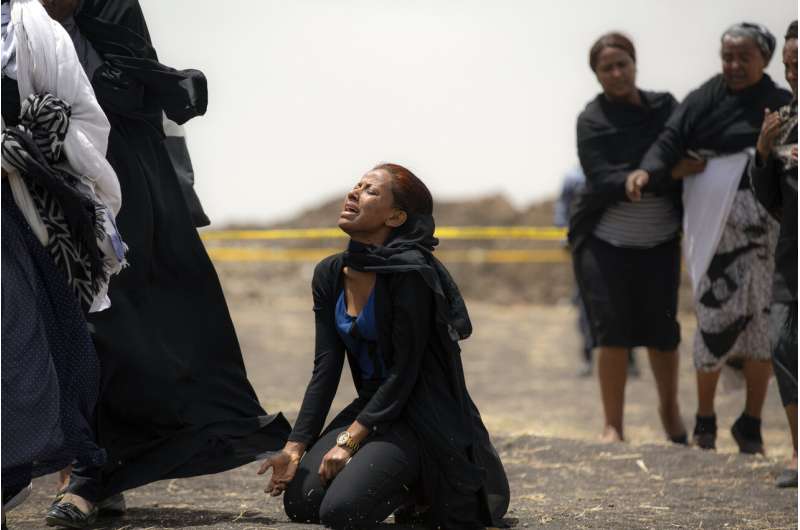Ethiopia report blames jet crash mostly on Boeing software

Ethiopian investigators are mostly blaming Boeing for last year's crash of a 737 Max jet shortly after takeoff, saying in an interim report Monday that there were design failures and inadequate training for pilots.
The update from Ethiopia Aircraft Accident Investigation Bureau a day before the anniversary of the crash pointed to the role of a new flight-control system that Boeing installed on the 737 Max and which repeatedly pushed the nose of the plane down.
All 157 people on board were killed when flight 302 crashed into a field six minutes after takeoff from Addis Ababa. Every Max jet worldwide was grounded within days of that crash.
___
WHAT WE KNOW
The flight control system, called MCAS, for Maneuvering Charcteristics Augmentation System, defeated the pilots' efforts to control the plane. When it triggered for the fourth and final time, the pilots fought back on their control columns, but the nose of the plane sank even more and the jet flew even faster.
Shortly before impact, the jet plummeted toward Earth at 575 mph (925 kph)—at the rate of more than 5,000 feet (1,500 meters) per minute—with its nose tilted down at a 40-degree angle, according to the report.
The investigators issued several recommendations to Boeing in the report and placed little blame on the airline or its pilots. In that regard, the Ethiopian update differed from a final report that Indonesian investigators issued after a 737 Max operated by Lion Air crashed in October 2018.
Data in the Ethiopian update, however, could renew questions about the pilots' decision to turn MCAS back on after first disabling it when the plane's nose pitched down. One aeronautics expert said restoring power to MCAS doomed the flight.
___
WHAT WE DON'T KNOW
A full analysis of the crash is expected later this year with a final report. It's not clear whether Ethiopian investigators will then place most of the blame on Boeing and MCAS, or how much, if any, blame will be assessed to the pilots. The interim report also doesn't have a full transcript of the cockpit voice recorder.
___
WHY IT'S IMPORTANT
The final report could influence how soon the U.S. Federal Aviation Administration will let the grounded Max fly again. It also will be helpful in training pilots on how to handle the blizzard of alarms that go off when a plane starts having problems so they can diagnose the trouble and deal with the most critical things.
© 2020 The Associated Press. All rights reserved. This material may not be published, broadcast, rewritten or redistributed without permission.





















